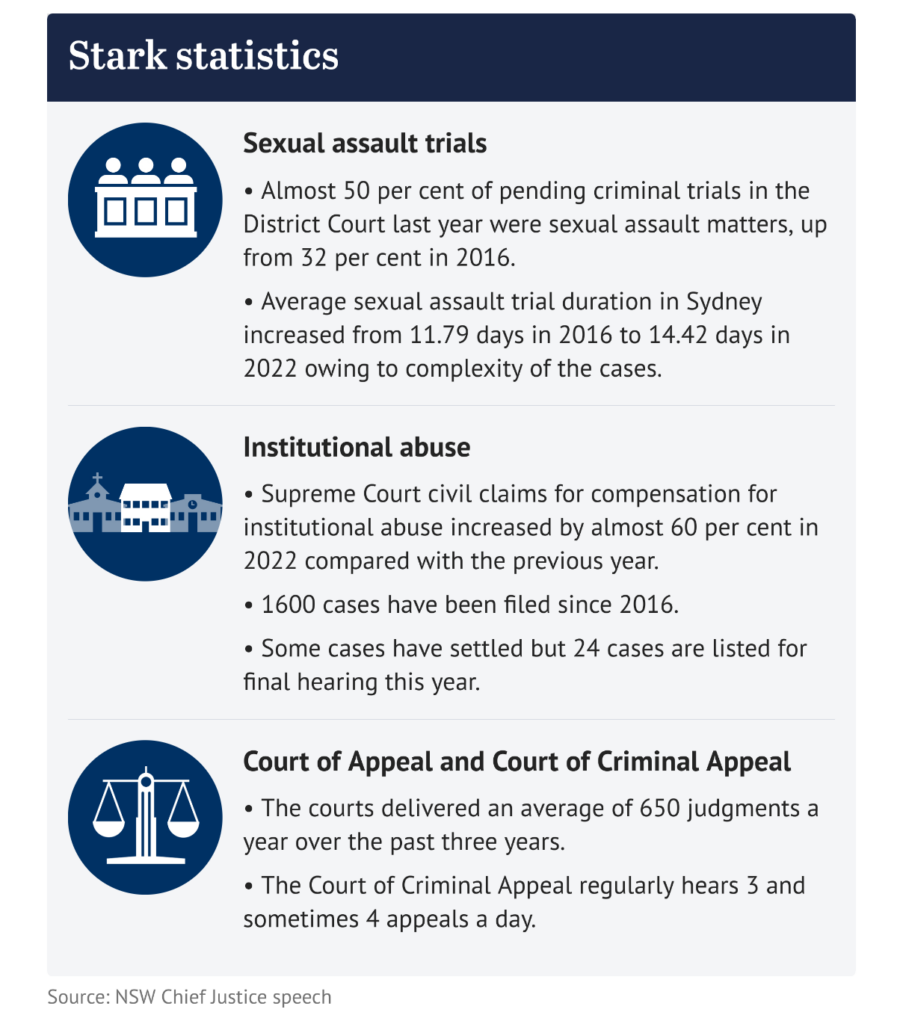
Sexual assault cases constituted almost half of criminal matters awaiting trial in the District Court last year, while the number of people seeking compensation in the Supreme Court for institutional abuse has risen sharply, the state’s top judge says.
In a speech last night to mark the law term opening, NSW Chief Justice Andrew Bell gave an overview of the courts’ work. He told the gathering that almost 50 per cent of pending criminal trials in the District Court last year were sexual assault matters, “up from 32 per cent in 2016”.
“The complexity of sexual assault trials has also resulted in an increase in the average trial duration in Sydney from 11.79 days in 2016 to 14.42 days in Sydney in 2022,” Bell said.
There were 571 sexual assault trials filed in the District Court in 2021, according to the court’s most recent annual review, accounting for 38 per cent of the 1489 criminal trials filed that year. In 2020, the figure was 35 per cent and in 2019 it was 39 per cent.
This is a different calculation to criminal cases pending trial in the court, which may have been filed in another year.
Bell said the work of the District Court would “no doubt” increase after new laws criminalising coercive control in the state, passed by state parliament in November, commenced in 2024.

The laws have a lengthy implementation period to educate frontline workers, lawyers, police and judges on the changes.
Bell said civil claims filed in the Supreme Court for compensation arising from institutional abuse had “exploded, with over 1600 cases [filed] … since detailed monitoring commenced in 2016”.
Some 621 institutional abuse cases were filed last year compared with 345 the previous year.
“Whilst a good number of these cases have settled, as at mid-December 2022, 24 are listed for final hearing this year,” Bell said.
Of the 571 sexual assault trials filed in the District Court in 2021, 284 involved child sexual assault.
On Wednesday, NSW Attorney-General Mark Speakman and Premier Dominic Perrottet announced that measures aimed at reducing trauma for child sexual assault complainants in court would be expanded beyond Sydney and Newcastle from July 1 to every District Court in the state.
“Young people are able to pre-record their evidence and are provided with intermediaries to assist them during police interviews and hearings, as well as supports to spare them the trauma of facing their alleged attacker in court,” Perrottet said.
Speakman said that “we need to do all we can to ensure that children and young people who have been sexually abused are supported through the court experience, so they can begin the process of rebuilding their lives”.
Bell said the Court of Appeal and Court of Criminal Appeal together delivered an average of 650 judgments a year over the past three years and the Court of Criminal Appeal regularly heard “three and sometimes four appeals a day”.
“This volume and rate of work far exceeds that of other appellate courts in the country which in the main have a higher proportion of Supreme Court judges as a percentage of their population than is the case in NSW,” he said.
“Unfortunately” the Supreme Court was also anticipating a “very significant” increase in cases involving banks seeking possession of real estate, Bell said, with rising interest rates “likely to be productive of extreme mortgage stress, exacerbated by the end of the COVID-related moratorium on actions for possession”.
